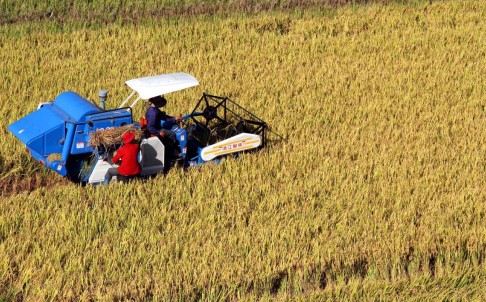China's new farmers are using e-commerce to transform agriculture
Du Qianli completed his postgraduate studies at Zhengzhou University in 2008. Unlike most of his classmates who became white-collar workers, Du returned home to a remote village in the Taihang Mountains, where he set up an online shop selling local produce.
"Villagers looked down on me, asking why a man with a master's degree had returned to the countryside," he said.
But today, Du's shop at Taobao.com, the mainland's leading e-commerce platform, earns him a profit of more than 100,000 yuan (HK$126,530) a month, as farmers embrace environmentally friendly ways of farming, which Du, a major purchaser of organic and prime produce, requires of them.
Du is just one of a flock of well-educated, technology-savvy young people who have moved to rural areas to become "new farmers" in recent years.
Unlike traditional farmers who work small plots without access to market information, the new farmers take advantage of the internet and envision agriculture with social responsibility, creativity and a better sense of the market, says a report on this emerging group by Alibaba's research armAliResearch.com.
Such new farmers - estimated at about one million - make up the increasing number of people selling farm produce through online shops and have changed the way agricultural produce is being distributed, says AliResearch's Chen Liang . About 3.7 billion yuan worth of agricultural products were sold on Taobao in 2010; last year saw 40 billion yuan in sales.
"Traditional growers didn't have a say in pricing. But now e-commerce has allowed them to face consumers directly, greatly improving their negotiating power," Chen said.
The involvement of young, well-educated people in agriculture had also helped improve food safety, protect the environment and build strong brands for producers, the report said.
Yang Zongqiang , a former consultant who quit his job at a British company in Shanghai and returned to rural Hunan to grow organic vegetables, said a desire for "the original taste of food" led him to give up his career in the city.
"No matter how much the world changes, we will still stick to the principle of refraining from using pesticides, chemical fertilisers and hormones," Yang said.
Du said that when he started his online business he could not dictate how the produce was grown. But as orders swelled, he set up a farmers' cooperative that required growers to work according to his standards.
"I asked them not to use pesticides and chemical fertilisers, and in return offered them much better prices," Du said.
"After we did away with the chemicals, our capsicum yields dropped by more than half. But the improvement in quality and the higher prices we got compensated for that. Consumers are willing to pay as long as they are guaranteed a better product."
As his business grows, his wife is taking over daily operations while Du teaches at a village school. He hopes more children living in the mountains can benefit from higher education.
Wang Hongbo , president of Pingan Securities, says new farmers will transform this essential industry. "They have a bigger dream than just making a living."
This article appeared in the South China Morning Post print edition as New farmers sow the seeds of change
Source: http://www.scmp.com/news/china/article/1662752/chinas-new-farmers-are-using-e-commerce-transform-agriculture


No comments:
Post a Comment